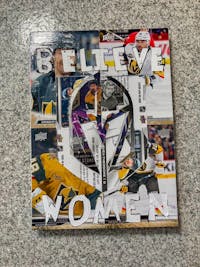Turkish delight in Boom Boom Boom
On a program trip to a center for underprivileged children in southwestern Turkey, one of the little boys we met kept asking us "Bu shookarrie?" After asking him to repeat the question a couple times, we finally resorted to calling over our program director for a translation. "That's not Turkish," she laughed. "You guys don't understand English anymore? He is saying: Bush or Kerry?" After laughing, the seven of us quickly asserted our political positions to these 8-year-old children in southwestern Turkey.
The children had been working on drawings representing different countries. Based on the drawing in front of us, a bomb-dropping plane was a good image to represent America.
After a month and a half in Turkey, we had grown accustomed to the anti-Bush, anti-Iraq War attitude that most Turks held. One Republican girl in my program, however, still seemed bewildered as to why there was no sketch of a gavel to represent justice, or some kind of bell to represent freedom.
She suggested that it was the French student volunteer working with the children who coaxed them into drawing the image they selected. Personally, I don't feel that any form of coercion is necessary to get kids living in Turkey-or anywhere in the world for that matter-to associate the United States with bombs.
A little boy who handed me a flower on the street one day asked me where I was from. When I told him I was American, his response sent a pretty clear message: "America?" Yes, I nodded. "Iraq. Boom. Boom."
Since the Iraq war, perceptions have changed profoundly in a country that used to be the U.S.'s most reliable Muslim ally. According to a BBC poll taken in January, 82 percent of Turks believe Bush's reelection made the world a more dangerous place, the highest figure in any country surveyed. In 2003, the Turkish Parliament voted to deny the U.S Army permission to open a northern front against Iraq from Turkish territory, and about 90 percent of Turks were opposed to the war.
While anti-Americanism is obviously not unique to Turkey, it certainly has manifested itself in an interesting way there. For example, a fictional American invasion of Turkey in 2007 is the subject of the country's current bestselling novel. Metal Storm has sold over 150,000 copies, and according to some reports, is also on the bookshelves of the foreign ministry and general staff. These numbers are impressive in a country where most Turkish books get printings of a few thousand at best. The book ends with a Turkish detonation of a nuclear bomb in Washington.
Though Americans may laugh at such an unrealistic and improbable proposition, it is not the element of fantasy that has made the book so popular with the average Turk. When referring to America's foreign policy, many Turks really do ask, "Who's next?" It is the aspect of reality that makes for such appealing reading. The co-author, Burak Turna, was quoted in several publications as saying the book was written not as fiction but rather as a "philosophical and scientific calculation. This novel is not just another conspiracy theory-it is a possibility theory."
I bought the book from a small shopkeeper near the Grand Bazaar, who ironically kept insisting I pay with dollars. It is in Turkish, and there is currently no English translation. Considering I can understand maybe one out of every ten words I hear in Turkish, it will be when Turkey invades America that I will have read the book. Until then, hopefully Harry Potter will move higher up the bestseller list.



Please note All comments are eligible for publication in The Justice.